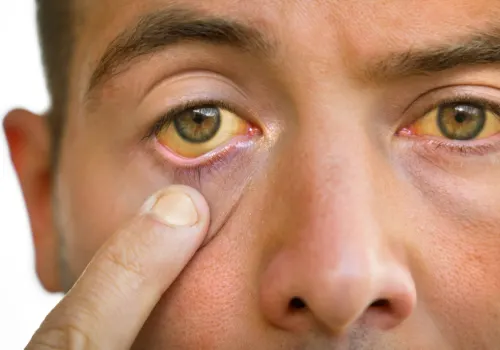
Noticing that your eyes or skin appear yellow can be concerning. This condition, known as jaundice, happens when there is a buildup of bilirubin in the blood. Normally, your liver processes bilirubin and removes it from the body. When that process is disrupted, bilirubin can build up, leading to a yellow tint in the skin and eyes.
Common Causes of Jaundice
Jaundice is not a disease itself—it is a symptom of an underlying health issue. Some common causes include:
- Liver conditions such as hepatitis, cirrhosis, or liver cancer
- Gallbladder or bile duct problems like gallstones or blockages
- Hemolysis, when red blood cells break down too quickly
- Newborn jaundice, which is common in babies and usually temporary
- Medications or infections that affect how the liver works
Symptoms That May Appear Alongside Jaundice
In addition to yellowing of the skin or eyes, other symptoms can signal liver or gallbladder problems:
- Dark urine or pale stools
- Itchy skin
- Abdominal pain or swelling
- Nausea, vomiting, or fatigue
- Unexplained weight loss
When to See a Doctor
While mild jaundice may not always indicate a serious condition, it’s important to get checked promptly. Sudden yellowing of the eyes or skin should never be ignored.
Seek medical attention if you experience:
- Severe abdominal pain
- Confusion or changes in alertness
- High fever with jaundice
- Rapidly worsening symptoms
How Jaundice Is Treated
Treatment depends on the underlying cause. Some cases may resolve on their own, while others require medical intervention. Possible treatments include:
- Medication adjustments if drug-related
- Procedures to remove gallstones or relieve bile duct blockages
- Lifestyle changes to support liver health (avoiding alcohol, healthy diet, exercise)
- Ongoing monitoring for chronic liver disease
FAQ: Jaundice and Yellow Eyes
Is jaundice always serious?
Not always, but it can signal a serious problem. Even mild cases should be evaluated to rule out liver or gallbladder disease.
Can dehydration cause yellow eyes?
No — dehydration does not typically cause yellow eyes. Yellowing usually points to a buildup of bilirubin from liver or bile duct issues.
How do doctors test for jaundice?
Blood tests, liver function panels, imaging (ultrasound, CT, MRI), and sometimes urine tests help determine the cause.
Can jaundice go away on its own?
In some cases (such as newborn jaundice or mild infection), yes. But in adults, it often requires treatment of the underlying condition.
Should I see a specialist for jaundice?
Yes. A primary care doctor may refer you to a gastroenterologist or hepatologist for liver evaluation.
The Bottom Line
Jaundice is a visible warning sign that something may be affecting your liver, gallbladder, or blood cells. If you notice yellowing of your eyes or skin, don’t ignore it—seek medical attention to identify the cause and begin appropriate care.
Request an appointment today with BASS Medical Group to get answers and peace of mind.

.webp)

.png)